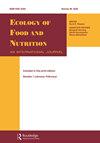Understanding the Meat-Masculinity Link: Traditional and Non-Traditional Masculine Norms Predicting Men's Meat Consumption.
IF 1.3
4区 医学
Q4 NUTRITION & DIETETICS
Ecology of Food and Nutrition
Pub Date : 2024-07-01
Epub Date: 2024-06-04
DOI:10.1080/03670244.2024.2361818
引用次数: 0
Abstract
Conformity to masculinity ideology predicts men's meat consumption and willingness to reduce their meat intake, but it is unknown which specific masculine norms account for these relationships. This study investigated which traditional and non-traditional masculine norms predict meat consumption, red and processed meat consumption, and willingness to reduce meat consumption in 557 Australian and English males. Men who support the use of physical violence and place high importance on sex ate more meat. Willingness to reduce was highest among men with gender egalitarian views. Targeting these specific masculine norms may be important for mitigating men's overconsumption of meat.
了解肉类与男性气质的联系:预测男性肉类消费的传统和非传统男性规范。
对男性意识形态的遵从可预测男性的肉类消费量和减少肉类摄入量的意愿,但究竟是哪些特定的男性规范导致了这些关系,目前尚不得而知。本研究调查了哪些传统和非传统男性规范可以预测 557 名澳大利亚和英国男性的肉类消费、红肉和加工肉类消费以及减少肉类消费的意愿。支持使用身体暴力和高度重视性的男性吃肉更多。持有性别平等观点的男性减少肉类消费的意愿最高。针对这些特定的男性规范可能对减少男性过量食用肉类非常重要。
本文章由计算机程序翻译,如有差异,请以英文原文为准。
求助全文
约1分钟内获得全文
求助全文
来源期刊
CiteScore
3.50
自引率
0.00%
发文量
23
审稿时长
>12 weeks
期刊介绍:
Ecology of Food and Nutrition is an international journal of food and nutrition in the broadest sense. The journal publishes peer-reviewed articles on all aspects of food and nutrition -- ecological, biological, and cultural. Ecology of Food and Nutrition strives to become a forum for disseminating scholarly information on the holistic and cross-cultural dimensions of the study of food and nutrition. It emphasizes foods and food systems not only in terms of their utilization to satisfy human nutritional needs and health, but also to promote and contest social and cultural identity. The content scope is thus wide -- articles may focus on the relationship between food and nutrition, food taboos and preferences, ecology and political economy of food, the evolution of human nutrition, changes in food habits, food technology and marketing, food and identity, and food sustainability. Additionally, articles focusing on the application of theories and methods to address contemporary food and nutrition problems are encouraged. Questions of the relationship between food/nutrition and culture are as germane to the journal as analyses of the interactions among nutrition and environment, infection and human health.

 求助内容:
求助内容: 应助结果提醒方式:
应助结果提醒方式:


